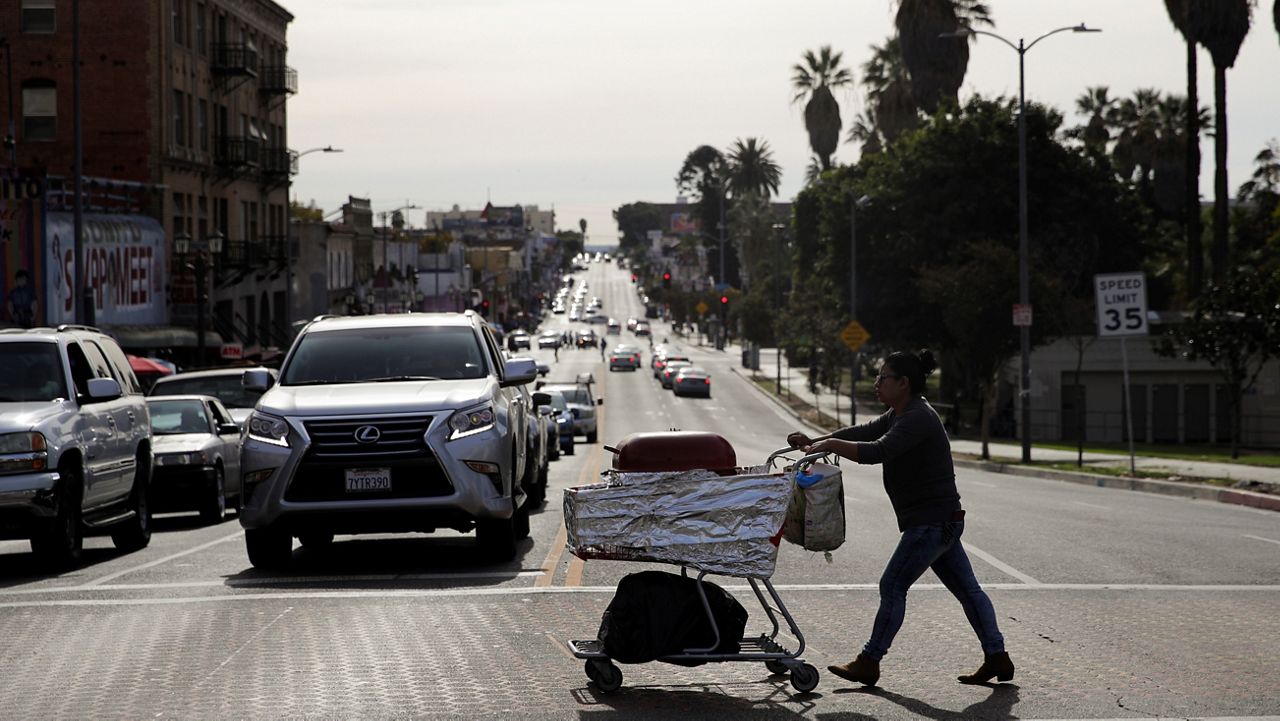LOS ANGELES (CNS) — A City Council committee approved a motion Friday calling for the development of a special vending zone, effectively allowing street vendors to sell their goods in areas of Hollywood, which they are currently barred from doing under city law.
The Civil Rights, Equity, Immigration, Aging and Disability Committee voted unanimously in favor of the motion, including a small change. Council members are calling for a report documenting the process to engage stakeholders and efforts to develop this street vending pilot program.
What You Need To Know
- According to the motion, council members would request the city attorney to prepare and present an ordinance updating the city’s existing street vending law
- The goal of the motion is intended to use lessons learned from this street vending pilot program to develop a citywide framework for allowing street vending in a more equitable way across the city
- The city’s Sidewalk Vending Ordinance excludes vendors from nine areas representing some of its most popular pedestrian areas, such as the Hollywood Walk of Fame and LA Live
- Following the unanimous vote from the committee, it will now move forward to the Public Works Committee for additional discussion before coming to the full council for a vote
Council members Hugo Soto-Martínez, Paul Krekorian, Curren Price and Nithya Raman co-presented the motion on Oct. 20. Soto-Martínez and Raman’s districts, 13 and 4, respectively, include portions of Hollywood.
According to the motion, council members would request the city attorney to prepare and present an ordinance updating the city’s existing street vending law.
The goal of the motion is intended to use lessons learned from this street vending pilot program to develop a citywide framework for allowing street vending in a more equitable way across the city.
The city’s Sidewalk Vending Ordinance excludes vendors from nine areas representing some of its most popular pedestrian areas, such as the Hollywood Walk of Fame and LA Live.
In December 2022, three community groups — Community Power Collective, East LA Community Corporation, and Inclusive Action for the City — and their attorneys, on behalf of sidewalk vendors, filed a lawsuit challenging the city’s street vending law, stating violations against SB 946, a 2018 state law legalizing street vending.
During Friday’s committee meeting, Soto-Martínez said he was glad to have a discussion and that those in attendance could witness how policy is made.
“I think what’s very clear is that all of us want street vending, but how it look like might have differences in opinions,” Soto-Martínez said. “That’s something that folks should be very mindful of.”
He also expressed his gratitude to sidewalk street vendors and advocates for their work and bringing this issue forward.
“I think my love for street vendors is pretty public. My parents were street vendors most of my life,” the councilman said. “There’s a lawsuit that’s currently happening right now brought forward by folks out there vending in the streets. But this motion does not interfere with that lawsuit.”
Councilwoman Eunisses Hernandez, who supported the motion, said she didn’t fully understand how this motion would address the “clear violations of state law that the city of L.A. is upholding.”
“There’s no question in my mind that we need to eliminate the `No Vending Zones,” Hernandez said. “And carefully review the other swaths of the city that we have a de facto ban on vending such as around schools and swap meets.”
She added, “There’s certain things that we are missing and not achieving the goal that we’re trying to perform with this motion.”
Councilwoman Monica Rodriguez recognized this would not be a “simple conversation” because it’s a challenging issue that will require cooperation from all sides.
“We’re trying to provide the proper space, but not to do so at the detriment of someone else. I think everyone needs to really honor and respect that for public health and safety, but also just the mere public safety concerns that have also been borne out of a lack of enforcement,” Rodriguez said.
On Oct. 20, a joint statement from the three community groups suing the city stated, “We appreciate the support of the council members authorizing this motion, as well as express acknowledgement that the city must bring its ordinance into legal compliance.”
However, in the statement, it was expressed that the motion failed to fully address the harms done to street vendors over the course of the last five years.
“But this motion does not actually propose to eliminate the unlawful `No Vending Zones,’ and it risks repeating the process that resulted in the illegal restrictions in the first place. The motion does not immediately end the city’s unjust exclusion of vendors from entire neighborhoods, nor does it address the deep financial, emotional and psychological harms experienced by vendors from years of draconian enforcement of these unlawful and exclusionary policies,” according to the joint statement.
The statement added, “We continue to welcome a conversation with the city that centers the voices and experiences of vendors, but we are not deterred from pursuing our strong legal claims and are confident that we will prevail in court if necessary.”
Following the unanimous vote from the committee, it will now move forward to the Public Works Committee for additional discussion before coming to the full council for a vote.



